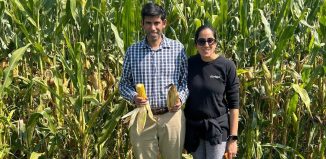SBU’s Maurizio Del Poeta conducts fungal research
Long term goal is to find drugs that help immunocompromised individuals fight fungal diseases
One of them brews beer, while the other makes his own pizza. While it sounds like a great mealtime combination, what Maurizio Del Poeta and James Konopka do when they’re at work may one day help you or your friends and family.
The two are scientists at Stony Brook Medical School who are working to unlock the secrets of different types of fungi that can cause significant health problems. Del Poeta is studying Cryptococcus neoformans, a fungus that can kill if it reaches the brain, while Konopka is working with Candida albicans, a fungus that normally lives with and on us but that can also do damage to internal organs, particularly the kidney.
Del Poeta, the pizza maker, has found a drug that targets a sphingolipid on the surface of Cryptococcus that clears the infection in the brains of mice. He recently applied to start testing that drug on humans. That process could take five years.
Konopka, the beer brewer, is targeting a 30-protein sequence in the cell wall of Candida. He is narrowing down the list of targets and hopes to start searching for effective drugs or therapies.
“These two men are superb,” said Jorge Benach, the chairman of the Department of Molecular Genetics and Microbiology. “They are sought after internationally and nationally” to address scientific audiences.
The Molecular Genetics and Microbiology department includes researchers who study viruses, bacteria and fungi. Benach said they are all aware of the potential medical benefit, even as they perform basic research to understand the way these pathogens work.
“It takes a while from what we do to the point where we can save lives,” he offered. “We are on that track. If you hit the ground running, you shorten that distance.”
The Times Beacon Record will profile the research of Konopka and Del Poeta in a two-part series. The Del Poeta feature will run today, while the Konopka story will run next week.
Maurizio Del Poeta loves stories. There’s the one about how he met his Italian wife when they were at Duke University. They were, he said with a laugh, two of the only three people originally from Italy at Duke.
He met her at a dinner party after he returned from a ski trip. The only complication: she was dating someone else.
“I was waiting for her to drop this guy,” he laughed. “He wasn’t good for her.”
Six months later, she became single and Del Poeta’s wait was over.
An avid reader, Del Poeta also has a story for a key insight into his research. While reading the late Michael Crichton’s anti-climate change novel “State of Fear,” an ironic choice given his findings, Del Poeta decided he had to test a fungus in a higher carbon dioxide environment, like that in the lung.
He was working with Cryptococcus neoformans, a fungus that is especially problematic in people who are immunocompromised — either through cancer treatments, drugs that suppress the immune system after organ transplants or in people with AIDS.
In the outside environment, a mutant type of this fungus grew normally, but “when you transfer it into the lung, it can’t grow anymore,” he explained.
When he studied it more closely, he found that a specific sphingolipid attached to the surface of the fungus in the mutant prevents it from growing in an environment that has 5 percent carbon dioxide (the concentration in the lung), compared with the approximately 0.4 percent in the atmosphere.
This sphingolipid and the genes and enzymes that lead to its production became a “fantastic target for developing drugs,” Del Poeta offered.
That discovery came in 2005. Del Poeta has spent the last seven years, including the last six months as a professor in the school of medicine at Stony Brook Medical School, looking for drugs that might target that sphingolipid.
He has found several that have worked. The survival rate of animals treated with these targeted drugs is 90 percent, compared with a 100 percent mortality rate when untreated.
Del Poeta submitted a grant to the National Institutes of Health for one of the drugs in February. It received a high score, he said, but it was not funded. After he conducted the promising mouse experiments this year, he resubmitted that grant in the middle of December. He hopes to hear back in the next few months.
The drug not only prevents the spread of an infection in the animal models but it clears the fungus from the brain. Currently in humans, there are no drugs that effectively eradicate the fungus in the brain.
Del Poeta said it may take five years before the drug goes through clinical testing to reach the pharmaceutical shelves.
While the drug is not toxic in animals, it’s unclear what reactions humans might have to it.
Del Poeta got involved in fungal research when he was a medical doctor at Duke. He observed that the patients he had who were immunocompromised, mostly because of AIDS, were dying because of this fungal infection.
He needed “to do something.” He consulted with his mentor John Perfect, who is now the director of the Division of Infectious Diseases at Duke, who suggested he choose between seeing patients and conducting research.
While he misses seeing patients, he finds his research satisfying, especially because of its potential practical impact.
In his research, he combines basic science with the search for drugs.
He explores the mechanism by which the sphingolipid limits the growth of the fungus. He is also looking at ways to boost other parts of the immune system that are not often weakened, even in immunocompromised individuals. He would like to raise the activity level of macrophages, neutrophils and Natural Killer (NK) cells.
A temporary resident of Port Jefferson, Del Poeta and his wife Chiara Luberto, who is studying leukemia at the cancer center at Stony Brook, recently bought a house in Mount Sinai. The couple have two young sons, Matteo and Francesco.
Del Poeta combined his passion for cooking and sharing amusing anecdotes in a cookbook called “Pasta con Amici.”
When he moved to South Carolina (a stop he made before landing at Stony Brook), he missed pizza so much that he built a brick oven with his father. He plans to build another one here, perhaps in 2013.
“I love stories,” he explained. “Behind a story, there is everything. Each of us has a fantastic story.”






